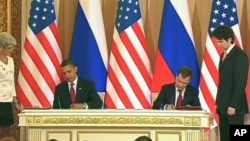The United States and Russia say a new strategic arms agreement will be formally announced when the presidents of both countries have spoken with one another about it. White House and Russian Foreign Ministry spokesmen say the conversation is expected soon. A new accord would set an auspicious tone for President Barack Obama's nuclear summit in Washington on April 12 and 13. The agreement faced difficult negotiations, and more problems could emerge during ratification in the U.S. Senate.
Before the United States and Soviet Union signed the 1991 Strategic Arms Reduction Treaty (START) both sides had tens of thousands of nuclear warheads. The pact mandated a reduction to about 6,000.
Seeking to reset Washington's strained ties with Moscow, U.S. Secretary of State Hillary Clinton promised to work closely with Russia to sign a new agreement for further reductions. She spoke in Geneva nine months before START was to expire in December 2009.
"There is a lot of work to be done," Clinton said. "We think this is a fresh start, not only to improve our bilateral relationship but to lead the world in important areas, particularly with respect to nuclear weapons and nuclear security."
During his visit to Moscow last July, President Obama said the United States and Russia must lead by example to reduce the threat of nuclear proliferation. He later reported progress toward that goal, even though the old START treaty had expired.
Russian analyst Viktor Litovkin, associate editor of the Independent Military Review, says several issues held up agreement.
Litovkin says that first of all, these were issues of verification, transparency and control - control equivalence. Another obstacle, he adds, was undoubtedly the connection between strategic offensive and strategic defensive weapons.
The new agreement is expected to reduce each country's number of nuclear warheads for each side to about 1,500.
Delivery systems, such as missiles and bombers, will also be limited.
It also raises expectations for further weapons reductions in the years ahead.
Moscow expressed concern throughout the negotiating process that a U.S. missile defense system in central Europe proposed by the Bush Administration would neutralize Russian offensive weapons. This despite U.S. assurances that the system was designed to defend against Iran. President Obama reconfigured the proposed system and moved its elements closer to Iran.
Treaty ratification will require 67 votes in the U.S. Senate. Mindful of Republican opposition to any agreement that limited missile defense in Europe, U.S. negotiators are reported to have pushed the issue hard with Russian counterparts.
Russian Foreign Minister Sergei Lavrov assured Secretary Clinton in Geneva last year that his country shared America's common non-proliferation goal, including Iran and the Korean peninsula.
The 1991 START treaty took more than 400 days to ratify. But whatever the fate of the new START agreement, U.N. Secretary General Ban Ki-moon recently underscored its immediate importance.
"This will have a hugely positive impact on the forthcoming Washington summit meeting on nuclear disarmament as well as the NPT [Nuclear Proliferation Treaty] review conference which will be held in May in New York," Mr. Ban noted.
And success of that conference, said Mr. Ban, can help the whole world live without fear of nuclear weapons.












